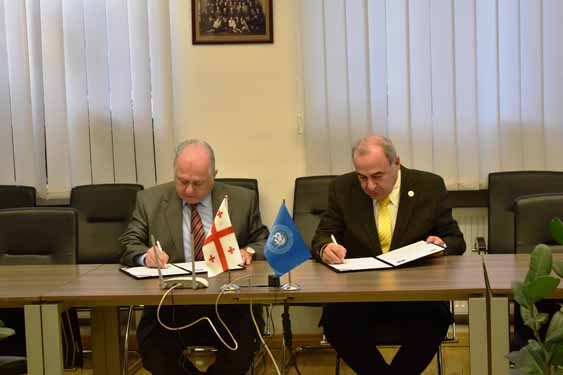
 |
Print | Close |
 Students of Ivane Javakhishvili Tbilisi State
University (TSU) will undergo internship and get jobs at the Supreme Council of
Autonomous Republic of Abkhazia, as envisaged in the Memorandum of Cooperation
between TSU and the Tbilisi-based Supreme Council of Abkhazia. The Memorandum
was signed by Rector of TSU, George Sharvashidze and Chairman of the Supreme
Council, Jemal Gamakharia.
Students of Ivane Javakhishvili Tbilisi State
University (TSU) will undergo internship and get jobs at the Supreme Council of
Autonomous Republic of Abkhazia, as envisaged in the Memorandum of Cooperation
between TSU and the Tbilisi-based Supreme Council of Abkhazia. The Memorandum
was signed by Rector of TSU, George Sharvashidze and Chairman of the Supreme
Council, Jemal Gamakharia.
The Memorandum envisages sharing experience between
the parties, exchanging resources and promoting student employment.
Rector George Sharvashidze said that TSU and the
Supreme Council of Autonomous Republic of Abkhazia have a diverse cooperation.
“A lot of projects have been implemented in partnership with the Supreme
Council of Abkhazia, including the preparation program for entrants living in
the occupied regions, which is very successful. We are working in many other
directions and will continue our collaboration in the future,” Rector
Sharvashidze said.
“Since the day of its foundation, Tbilisi State
University had been paying huge attention to the developments in Abkhazia and
this tradition still exists,” Chairman of the Supreme Council, Jemal Gamakharia
said, adding that by signing the Memorandum, the collaboration with TSU will further
intensify. “We will use TSU’s huge intellectual resource, while students will
undergo internship at the Supreme Council of Abkhazia and they will have an
opportunity to get jobs there,” he noted.
The Supreme Council of Abkhazia will cooperate with
the TSU Faculties of Social and Political Sciences, and Law, as well as the
Abkhaz Language and Culture Center.
Dean of the TSU Faculty of Social and Political
Sciences, Tamar Dolbaia said that a number ofAbkhazia-related scientific papers
and projects had been prepared at the faculty with the participation of
students. “By its essence, the Faculty of Social and Political Sciences
studies, researches and thinks about the perspectives of relations with
Abkhazia, its history, present and future. We will continue our work in this
direction,” Tamar Dolbaia noted.